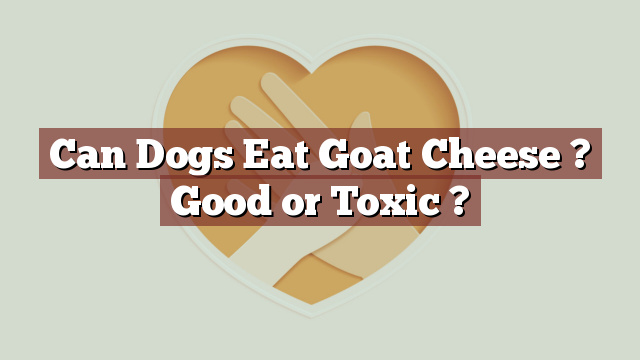Can Dogs Eat Goat Cheese? Good or Toxic?
Dogs are known for their scavenging behavior, always ready to gobble up any food they can get their paws on. As responsible pet owners, it is crucial to be aware of what foods are safe for our furry friends to consume. In this article, we will explore whether dogs can eat goat cheese and determine if it is a healthy option or potentially toxic to them.
Nutritional Value of Goat Cheese: Is it a healthy option for dogs?
Goat cheese, a popular dairy product in many households, is often praised for its nutritional value. It is packed with essential nutrients such as protein, calcium, phosphorus, and vitamins A and B. These nutrients play a vital role in maintaining a dog’s overall health and well-being. However, it is important to note that while goat cheese may offer some nutritional benefits, it should be consumed in moderation.
Can Dogs Eat Goat Cheese? Unveiling the safety of this popular dairy product.
The answer to the question "Can dogs eat goat cheese?" is yes, but with caution. While some dogs may tolerate and enjoy small amounts of goat cheese without any adverse effects, it is essential to consider a few factors. Dogs, in general, are lactose intolerant, and goat cheese, like other dairy products, contains lactose. Lactose intolerance can cause digestive issues in dogs, leading to symptoms like diarrhea, gas, and stomach upset.
Additionally, some dogs may be allergic to goat cheese or dairy products in general. Allergies can manifest in various ways, including itching, skin rashes, vomiting, or even more severe reactions. It is crucial to observe your dog’s reaction after consuming goat cheese and discontinue its consumption if any adverse symptoms occur.
Potential Risks or Benefits of Feeding Goat Cheese to Dogs.
Feeding goat cheese to dogs can have both potential risks and benefits. On the one hand, the nutritional content of goat cheese can provide some health benefits, such as promoting bone strength due to its calcium and phosphorus content. Additionally, the protein in goat cheese can support muscle development and repair.
On the other hand, the lactose and potential allergens present in goat cheese can pose risks to dogs. Lactose intolerance can lead to digestive discomfort and gastrointestinal issues, while allergies can cause a range of symptoms, from mild irritation to severe reactions.
What to do if your dog accidentally consumes goat cheese?
If your dog accidentally consumes goat cheese, it is important to monitor their reaction closely. If your dog shows any signs of digestive upset, such as diarrhea or vomiting, it is advisable to withhold food for a few hours to let their stomach settle. Ensure they have access to fresh water to stay hydrated. If the symptoms persist or worsen, it is best to consult a veterinarian for further guidance.
In conclusion: Weighing the pros and cons of dogs consuming goat cheese.
In conclusion, while dogs can eat goat cheese in moderation, it is important to consider the potential risks and benefits. The answer to the question "Can dogs eat goat cheese?" is yes, but with caution. While goat cheese may offer some nutritional benefits, it can also trigger digestive issues or allergic reactions in some dogs. It is crucial to monitor your dog’s reaction and consult a veterinarian if any adverse symptoms occur. Ultimately, the decision to feed your dog goat cheese should be made based on their individual tolerance and overall health.
Thank you for investing your time in exploring [page_title] on Can-Eat.org. Our goal is to provide readers like you with thorough and reliable information about various dietary topics. Each article, including [page_title], stems from diligent research and a passion for understanding the nuances of our food choices. We believe that knowledge is a vital step towards making informed and healthy decisions. However, while "[page_title]" sheds light on its specific topic, it's crucial to remember that everyone's body reacts differently to foods and dietary changes. What might be beneficial for one person could have different effects on another. Before you consider integrating suggestions or insights from "[page_title]" into your diet, it's always wise to consult with a nutritionist or healthcare professional. Their specialized knowledge ensures that you're making choices best suited to your individual health needs. As you navigate [page_title], be mindful of potential allergies, intolerances, or unique dietary requirements you may have. No singular article can capture the vast diversity of human health, and individualized guidance is invaluable. The content provided in [page_title] serves as a general guide. It is not, by any means, a substitute for personalized medical or nutritional advice. Your health should always be the top priority, and professional guidance is the best path forward. In your journey towards a balanced and nutritious lifestyle, we hope that [page_title] serves as a helpful stepping stone. Remember, informed decisions lead to healthier outcomes. Thank you for trusting Can-Eat.org. Continue exploring, learning, and prioritizing your health. Cheers to a well-informed and healthier future!

